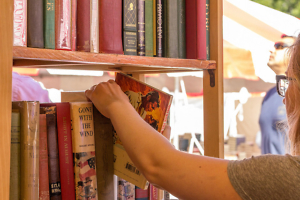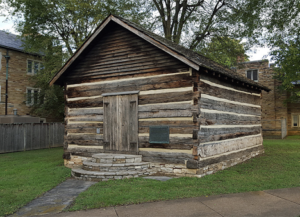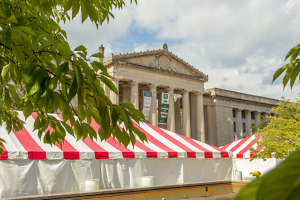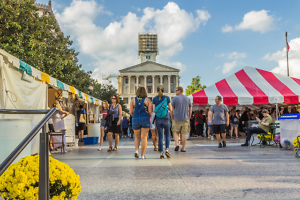Going to Meetin’
There’s nothing like the connections that bring writers and readers together at the Southern Festival of Books
I’ve been coming to the Southern Festival of Books for years and years, and each time I cross the border from Kentucky, and then cross the Cumberland River into downtown Nashville, I feel that I’m replaying pioneer history in my head.
 In the early days of the Cumberland Settlements, when pioneers from Virginia and North Carolina were struggling to build forts and check out the terrain for growing corn, there were two brothers, Samuel and Philip Mason, who killed two Native Americans at a salt lick. The next day the local tribe got its revenge, killing Philip Mason at Kilgore’s Station.
In the early days of the Cumberland Settlements, when pioneers from Virginia and North Carolina were struggling to build forts and check out the terrain for growing corn, there were two brothers, Samuel and Philip Mason, who killed two Native Americans at a salt lick. The next day the local tribe got its revenge, killing Philip Mason at Kilgore’s Station.
When I learned about this incident, I experienced one of those chilling moments when you realize that if history had veered but a hair or two, you wouldn’t exist. I couldn’t get the thought out of my mind—what if it had been Samuel and not Philip who was killed? Samuel Mason was my third great grandfather. He helped build Mansker’s Fort, which you pass on I-65 near the Goodlettsville exit.
And what about the original inhabitants of this land? How many more did he kill before he got religion during the Second Great Awakening? Or is that what the awakening was about?

On October 2, 1802, Samuel Mason was ordained as a deacon by Francis Asbury, the frontier Methodist bishop on horseback, and the ordination took place at Strother’s Meeting House in Sumner County. This log cabin is a historic place, site of the first western Conference of the Methodist church in Middle Tennessee. Although it was used as a corncrib for about seventy years, it now sits securely at Scarritt Bennett Center, near Vanderbilt, where it looks, well, cute. If it had a window or two, it would be an excellent writing studio.
Coming into Nashville for the Southern Festival of Books, I travel my personal ancestral avenue into the imagination, and I especially like to imagine those camp meetings on the frontier, when people traveled by wagon or on horseback and pitched their tents in a clearing and stayed for days, getting riotous and rowdy as they listened to sermons and salesmen and prognosticators. They sought news and gossip and fellowship and elevation of the spirit. Right there is the dichotomy of the church and the devil’s music that persists in the powerful pillars of modern Nashville—religious publishing and country music.
And here we are today, when writers and readers throng into Nashville on an October weekend seeking fellowship and elevation of the spirit and news and gossip. But especially old friends and new books. This festival is thirty years old now, part of history. It is even on the Tennessee Wall Of History in the Bicentennial Capitol Mall. Writers read and talk about their works. We are quite a swarm each October.
 So many times I’ve looked out the hotel window at the tents full of books on the Plaza below. During the night they are all closed up, waiting. In earlier years, I would sometimes run a mile or two around the place in the hours before the tent flaps opened.
So many times I’ve looked out the hotel window at the tents full of books on the Plaza below. During the night they are all closed up, waiting. In earlier years, I would sometimes run a mile or two around the place in the hours before the tent flaps opened.
Sometimes while I was in town, I poked into the Tennessee archives by the Capitol, seeking old stories, and I tend to superimpose the pioneer past on the glitter and building cranes of modern Nashville. Now I see that all the writers rushing into Nashville for this festival are the legacy of those early settlements, telling their stories, telling the story of America. Writers tell the story of our nation, whether it is in cookbooks, histories, thrillers, novels, scholarship, or tales for children.
Some memories:
• The book collector from Chicago who comes every year with some newfound edition he wants signed. What a joy to recognize faces, to find people from my home region, or to sign books for people with wonderfully original names. (Do you spell that Jean Ella?) Even cousins and distant kin show up.
• The lively volunteers who run the hospitality room, where writers get a goodie bag of Goo Goo Clusters with fruit and cookies and a wee dram of Jack Daniel’s.
• The authors’ dinner in the War Memorial Auditorium, where each table of festival patrons is hosted by an author. This year it might be Ben Fountain or Charles Frazier, Rebecca Makkai or Deborah Plant or Luis Alberto Urrea.
• In 2013, driving from Kentucky, whizzing on past Mansker’s Fort, to get to the Plaza in time for a group photo of several regulars for the twenty-fifth anniversary of the festival. In the photo, along with old friends Lee Smith and Roy Blount Jr., was John Egerton, who died unexpectedly a few weeks later. I was fond of visiting with him and his wife, Ann, at her booth of antiquarian books, and his pleasant, generous presence is deeply missed.
• Arriving early and sitting alone in the restaurant at the Sheraton when Katherine and Charles Frazier walked in and said, “May we join you?”
• A drink in the bar there with Garrison Keillor. He’s not Southern, but his initial inspiration for Prairie Home Companion was the Grand Ole Opry.
• The pleasure of listening to the lovely, gracious late Rebecca Bain of WPLN. In the car on the way to Nashville I would sometimes catch a special interview with someone who had a new book at the festival.
• Robert Cheatham, former president of Humanities Tennessee, often at the microphone, introducing a writer or making an announcement, and always providing a cohesive voice for our purpose.
• And a relatively recent discovery: at the Hermitage Hotel, the astonishing black-and-neon-green decor of the historic Art Deco men’s room. With Roy Blount Jr., as our tour guide/guard, a friend and I got to see this exceptional sight.
And then there’s the tiny Bluebird Cafe, where I had the privilege of seeing Lee Smith, Jill McCorkle, Matreca Berg, and Marshall Chapman perform “Good Ol’ Girls.” I had written a story once about a small town Kentuckian with dreams of a hit record who, with his little ragtag band, got a gig in Nashville at the Bluebird. At the time I had no idea that there was an actual Bluebird Cafe for just such up-and-coming musicians. With Nashville and the South, even if we don’t know the history, we can intuit it and still be right. That’s fiction writing for you.
 Another personal story. Back in the 1980s, I wrote a novel called In Country about a seventeen-year-old girl named Sam whose father had died in Vietnam before she was born. At the Southern Festival of Books more than fifteen years later, a young woman appeared before me.
Another personal story. Back in the 1980s, I wrote a novel called In Country about a seventeen-year-old girl named Sam whose father had died in Vietnam before she was born. At the Southern Festival of Books more than fifteen years later, a young woman appeared before me.
“I’m Sam,” she said.
And so she was, just as I had imagined her. She wore jeans and a denim jacket with doodads on it. She had short blond hair and she seemed just as sassy as Sam. She told me her father had been killed in Vietnam. She was the same age my teenage Sam would have been that year. About thirty-four. But I had already burst into tears of recognition when she said, “I’m Sam.”
That young woman was Karen Spears Zacharias, and she is now a prolific writer and a winner of the Appalachian Heritage Award.
These are the emotional connections that bring writers and readers together at the Southern Festival of Books. There’s nothing like it.
In 1802, when Samuel Mason became a deacon in that little log meeting house, people were rushing in from all over to a big camp meeting, seeking news, diversion, and enlightenment. This October, for many of the same reasons, I’m happy to be hitting the road to Nashville once again, eager to see the festival tents and to celebrate books and writers.
 Copyright (c) 2018 by Bobbie Ann Mason. All rights reserved. Mason is the author of Shiloh and Other Stories, In Country, and The Girl in the Blue Beret. Her most recent book is Patchwork: A Bobbie Ann Mason Reader. She lives in Kentucky.
Copyright (c) 2018 by Bobbie Ann Mason. All rights reserved. Mason is the author of Shiloh and Other Stories, In Country, and The Girl in the Blue Beret. Her most recent book is Patchwork: A Bobbie Ann Mason Reader. She lives in Kentucky.


